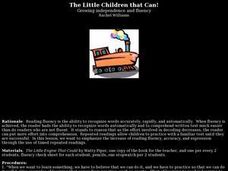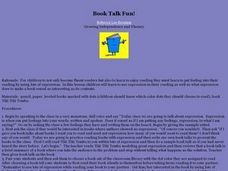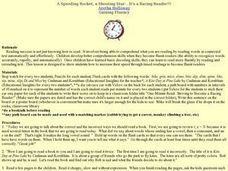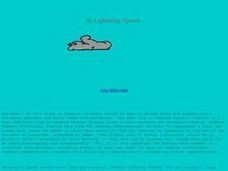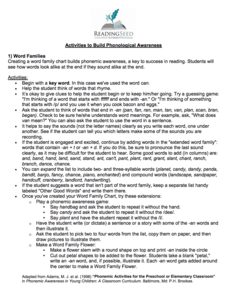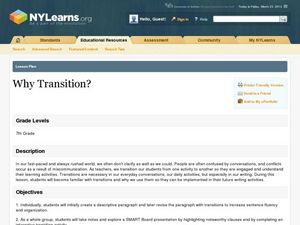Curated OER
We love to Express Ourselves: Growing Toward Independence and Fluency
Reading with expression is an important component in developing fluency. Emerging readers learn different strategies for accomplishing this skill through the teacher's model reading of Earrings!. Partner practice is combined with...
Curated OER
Fun With Fluency
Practice reading with fluency by blending words together. To start, prepare flash cards with pseudowords on them (words that can be pronounced but have no real meaning), and work with the class to sound out the words using known...
Curated OER
Bounce into Speedy Reading: Growing Fluency and Independence
Increased reading comprehension begins with decoding and automatically recognizing words, which is the focus of this instruction. Using their choice of six different Winnie the Pooh stories, partners practice a variety of strategies for...
Curated OER
It's All About Expression: Growing Independence and Fluency
In an engaging anticipatory set, the teacher uses several different strategies to activate prior knowledge about reading with expression, including using sentence strips (that must be prepped ahead of time) to show different moods. The...
Curated OER
The Little Children That Can: Growing Independence and Fluency
Get ready to boost fluency in the classroom with this lesson geared toward elementary readers. Listening to the first half of The Little Engine That Could, learners focus on how voice changes create expression. They then read the rest...
Curated OER
Expression Direction: Growing Independence and Fluency
Looking to move children away from monotone reading? That's what they will practice here. In a guided learning lesson, the class reviews punctuation marks and practices what type of intonation should accompany each. They then listen as...
Curated OER
Book Talk Fun!: Growing Independence and Fluency
Master reading fluently and with emotion and expression! Young learners read and reread the book Tiki Tiki Tembo by Arlene Mosel to practice this strategy. The remark on the end punctuation to help them decide how to read the sentence.
Curated OER
A Speeding Rocket, a Shooting Star... It's a Racing Reader!
Prepare a gameboard and die-cut race cars to play a fun fluency game. Also create several flash cards to review the long /i/ sound. Then, model reading smoothly and with expression, emphasizing the importance of re-reading texts to...
Curated OER
At Lightning Speed
Review how to decode words and practice repeated readings for fluency. Kids review the cover-up method as a way to decode unknown words and then practice reading sentences for fluency and short passages with partners. They record their...
Curated OER
Get the Chicks in the Coop
Readers work to increase the speed of their out-loud reading to improve overall fluency. They work with partners to time and record how far they read in one minute using the book Click, Clack, Moo Cows That Type. The procedures mention...
Curated OER
What Kind of Ladybug Are You?
As a class, read different sentences prepared by the teacher, identifying the punctuation that is needed for the appropriate expression. In small groups, have each child assume the role of one or more character in The Grouchy Ladybug by...
Curated OER
Only the Facts
Practice the strategy of summarizing to gain meaning and knowledge from an informational text. Young readers highlight supporting details and main ideas, and then they use this to summarize two articles: "The Great Quake" and "What is an...
Literacy Connects
Activities to Build Phonological Awareness
Begin your reading program each day with a mini lesson on phonological awareness using these engaging activities listed in the resource. Young ones will enjoy word families, clapping and counting syllables, identifying single sounds and...
Curated OER
Lights, Camera, and Action!
These activities center around acting out a play to help create fluent readers who use expression and emotion. As readers work through the play the first time, they also practice decoding strategies. In small groups of four, they then...
Curated OER
Why Transition?
Help your class transition into better writers with this lesson, which guides them through the process of adding transitions to increase sentence fluency and organization. The activity is designed for a classroom with a SMART board, but...
Curated OER
What Do You See at the Pond?
With What Do You See at the Pond?, young readers explore pond life and practice reading strategies. Learners first make predictions and then read the simple story independently. After a second read-through with a partner, kids come...
Curated OER
ESOL Competencies: Telephone Communication
Help, there's an emergency! Adult English language learners need to know how to express concern and call for help in an emergency. Provide them with this comprehensive list of vocabulary and lead them through the exercises given....
Curated OER
Frederick Douglass, Narrative of the Life of Frederick Douglass an American Slave, Written by Himself
Foster reader confidence when encountering complex text and reinforce the skills readers have acquired to build and extend their understanding of text. The plan uses a section of Douglass’ narrative as an exemplar text. Directions for...
Curated OER
Active and Passive Voice: Finding Examples Online
Incorporate technological fluency with a search for examples of active and passive voice in online resources. Discuss how use of active or passive voice influences mood or tone and contributes to author's purpose. List of...
Curated OER
Nonfiction Genre Mini-Unit: Persuasive Writing
Should primary graders have their own computers? Should animals be kept in captivity? Young writers learn how to develop and support a claim in this short unit on persuasive writing.
Other popular searches
- Sentence Fluency 3rd Grade
- Writing Sentence Fluency
- Six Traits Sentence Fluency
- Writing Sentence Fluency
- Sentence Fluency Worksheet
- Sentence Fluency in Writing
- Sentence Fluency for Fact
- Sentence Fluency Word Sort
- Sentence Fluency Esl
- Sentence Fluency Lessons
- Sentence Fluency for Fcat






